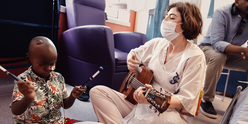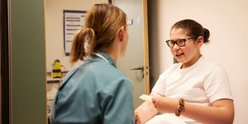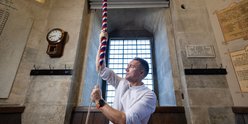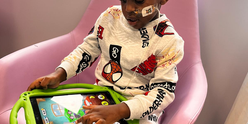She wants to be a nurse after treatment: Meet Jess
5 Sep 2024, 11:23 a.m.
This September, Jess will have her first day at school. It will be a huge milestone for her and her parents, Lee and Charlotte.
Not only because it’s the next step in her education, but also because just last year, she was diagnosed with an aggressive brain tumour at Great Ormond Street Hospital (GOSH).
She spent months undergoing treatment, including surgery, chemotherapy and radiotherapy.
Missing out on nursery was difficult, but Jess enjoyed spending time with the hospital’s Play team, making arts and crafts, and discovered a love of ballet through GOSH Arts.
Jess’s dad, Lee, shares their family’s story.
The weekend when everything changed
Jess first arrived at GOSH in May 2023, after scans at her local hospital showed an abnormality on the brain.
The day before, she had been making paper crowns for the coronation weekend. “We went from a healthy, happy Jess, to not knowing if she was going to make it,” Lee says. “We didn’t know what was going on. Total confusion, total shock, total upset.”
Shortly after arriving at GOSH, a surgeon visited the family on Koala Ward. They were told Jess would have surgery a few days later, which was scheduled to last at least eight hours.
“The intent was to remove as much of the mass on her brain as possible,” Lee says.
“Charlotte was four months pregnant at this point. We shared a camp bed that night, and as you can imagine, we didn’t get much sleep.”
Receiving a cancer diagnosis
The surgery was a success, and Lee remembers walking into Jess’s room to see her sitting up.
“One of Jess’s favourite TV shows is Ben and Holly’s Little Kingdom, and when we saw her, she started saying some of the things the characters say. In that moment we felt we had our girl back."
About a week after the surgery, Jess was given a diagnosis. “They told us that Jess had a type of cancer that is curable, but very aggressive,” Lee says. “We were in shock.”
Jess’s treatment began with chemotherapy and was followed by radiotherapy.
“She lost her hair pretty quickly. It started after the first round. That was upsetting,” Lee says.
Jess underwent 30 radiotherapy doses across six weeks, Monday to Friday. By the time this had finished, Charlotte was due to have a baby a week later.

Childhood moments at GOSH
Jess was supported by the oncology ward’s expert Play team, who are fully funded by GOSH Charity, and help make hospital stays a bit less hard and a lot more fun.
“They are amazing people,” Lee says. “They remember everything Jess likes, and how to make her feel comfortable when they are doing certain procedures, calm her down and keep her distracted.”
The team also spent time with Jess doing arts and crafts, including making slime and painting.
“It got to the point where nearing the end of treatment, Jess would say, ‘where are we going, daddy?’ and I would reply, ‘we are going to the playroom’. And she would be fine with that. She was happy to see them,” Lee says.
Jess also enjoyed meeting GOSH Arts, the arts programme at the hospital.
"They came in and danced with Jess. And she became really into ballet! We are keen to try and get her into some dance classes,” Lee says.
Finishing cancer treatment
Jess’s treatment finished with more chemotherapy.
“The final treatment felt like walking on clouds,” Lee says.
“Sadly, out of the three different types of drugs she had, this last one was the hardest.
“Going in for that final round, everyone on the ward was cheering her one saying, ‘last one Jess!’ It was fantastic.”
Jess rang the end of treatment bell in November 2023.
After finishing treatment, she was able to reunite with her nursery friends at a birthday party for the first time.
“I was looking forward to that, possibly more than she was!” Lee says.
A new chapter after GOSH

Jess went back to nursery earlier this year for two days a week.
For Lee and Charlotte, taking Jess back to nursery was an opportunity to prepare her for starting school.
“We were apprehensive about her going back to nursery,” Lee says. “We wondered if she was still going to play with her friends, if she was going to be frightened or anxious. But it was like she had only had a week off. It was beautiful to see. She came out skipping saying what a great time she’d had and that she wanted to go back tomorrow.”
Lee and Charlotte have noticed how confident their daughter has become.
“I don’t know if it’s her nature, or what she has been through, or both,” Lee says. “She has a great sense of humour. She’s very inquisitive too, which we love. Seeing her bond with her little brother, Joshua, has been a real treat at the end of this.”
Looking to the future, Jess has already decided on a future career.
"She keeps saying she wants to be a nurse, which is beautiful,” Lee says.
Help us build a new GOSH School
Right now, not all children are getting ready for the new school year with their friends. Some are preparing for their next round of treatment.
But we know that education is a key component of childhood, supporting a child’s development, wellbeing and mental health. That’s why GOSH has a dedicated school, teaching around 1,300 children and young people every year. The education kids receive at GOSH is outstanding. But the school is housed in a building from the 1930s and the facilities urgently need upgrading.
We want to ensure as many children as possible have the chance to continue their education in hospital. That's why we’re helping to build a new school, housed in the world-class Children’s Cancer Centre at GOSH.
The new school will be a nurturing and inspiring place for all GOSH patients, with double the capacity for teaching and more space for learning and play. Different age groups will have dedicated areas designed with their specific needs in mind, like a quiet study room for teens, and arts sinks and lots of craft storage space for younger children.
Technology will help keep children connected to their home schools, so they don’t feel so isolated, and beds can be brought in, so more children can learn with other kids around them. It will help create a familiar school environment at a time when it can feel like everything is unfamiliar.
School shouldn’t have to happen in hospital. But when it does, your support can help make it the best it can be.






